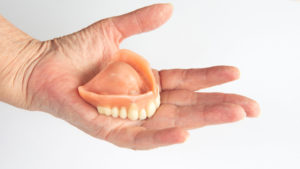How Do Dentures Affect Your Sense of Taste?
August 25, 2022

Imagine taking a bite of your favorite food but instead of savoring the taste… you hardly taste anything at all! As people grow older, their sense of taste often naturally diminishes. Some flavors, like sweet and salty, may stick around longer than others. Wearing dentures – no matter your age – can also impact your sense of taste. Have you replaced missing teeth with full or partial dentures? Then you will want to read about the relationship between dentures and taste below.
When Do Dentures Affect Taste?
Dentures can negatively impact your sense of taste in the following ways.
Full Upper Dentures
As you probably already know, most of your taste buds are located on the tip of your tongue. However, taste receptors can also be found in the cells of your cheeks, throat, and the roof of your mouth. Because full upper dentures typically include a base plate that covers the upper plate, this type of restoration can lead to a loss of taste. However, over time your brain may adapt to wearing dentures and your taste may return to normal.
Poorly Fitting Dentures
Properly fitting dentures should not shift or slip in your mouth. However, if your dentures don’t fit comfortably, you may need to use denture adhesive to keep them securely in place. If you use denture adhesive frequently, you may find that it leaves an unpleasant metallic taste in your mouth and alter your sense of taste.
Food and Stain Buildup
It’s important to clean, rinse, and soak your dentures daily. If you don’t practice good oral hygiene, food deposits and stains will naturally build up on your dentures. This can produce a foul taste in your mouth or interfere with your ability to taste foods.
Minimizing the Impact of Dentures on Taste
Here are three ways you can minimize the impact of dentures impacting your ability to taste food:
- Practice excellent oral hygiene – Brush your dentures daily to keep them in tip-top shape and prevent buildup that can cause foul smells and tastes. In addition, soak your dentures overnight for a deep clean and to give your gums a rest.
- Make sure your dentures fit – Do you frequently have to rely on denture adhesive? Take your dentures to a dentist to adjust or reline them so that they’ll fit properly.
- Consider dental implants – Take the denture base plate out of the equation with dental implants. Just four strategically placed implants can support an entire row of false teeth. Implants integrate directly with the jawbone to provide outstanding support for dental restorations.
Multiple factors can contribute to the loss of taste, including old age and wearing dentures. While you can’t turn back time, you can talk to your dentist about whether implant treatment is right for you.
About the Author
Dr. Steven Oshins has over 20 years of experience helping patients in Schenectady restore their smiles. A proud graduate of the University at Buffalo School of Dental Medicine, Dr. Oshins has also completed advanced training at the renowned Kois Center, including a course on the latest advances in dental implants. To learn more about the benefits of implant treatment, visit the Oshins of Smiles website or call 518-356-5635.
No Comments
No comments yet.
RSS feed for comments on this post.
Sorry, the comment form is closed at this time.

